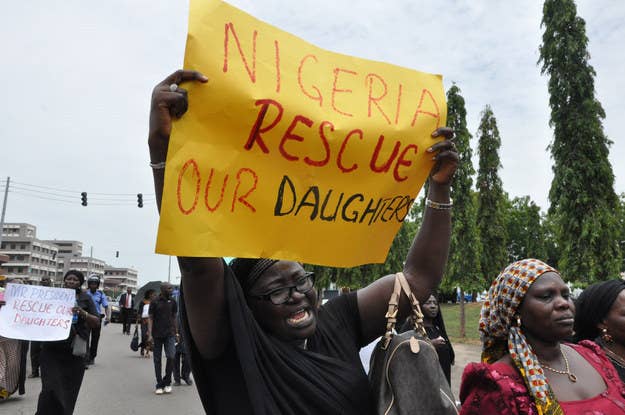
ABUJA, Nigeria — The governor of the northeastern Nigerian state where more than 300 girls were kidnapped nearly a month ago confirmed that the girls in a video released by the Islamist group Boko Haram on Monday are in fact among the kidnapped girls.
Shettima told a stunned crowd of around 100 people, most wearing red "Bring Back Our Girls" T-shirts, that 54 of the girls had been identified by name. The rallygoers have met every day since April 30 to demand greater action and accountability from Nigeria's federal and state governments to rescue the girls. On Tuesday, they marched to Shettima's office to seek answers to some of their many lingering questions.
But there was little other direct information to come from the meeting. Shettima has said in the past that he knew the location of the girls, but he declined to speak in specific terms about any of those claims, citing security concerns for the girls.
He told the crowd that he needed to speak carefully and with restraint, insisting on many points that he "knew enough" and "had a lot of information" that he could not share because he did not want to politicize the situation.
But he was unequivocal about one of the political touchstones of the story, including early allegations by the wife of President Goodluck Jonathan, and other leading members of Jonathan's political party, that the kidnapping story was a hoax.
"The certain truth is that those girls were abducted. They were abducted from the government secondary school," Shettima said.
In a press conference following the meeting, Shettima elaborated on what he told the crowd. He said the 54 girls identified by name from the video had been recognized by their parents; the rest, he said, had been confirmed as students at the school, and individual identifications are still ongoing.
Shettima also voiced his support for the Nigerian military, which has come under criticism for its response to the kidnapping. The military announced the day after the kidnapping that it had rescued more than 100 girls, then retracted the statement. Human rights group Amnesty International reported on May 9 that the Nigerian military had four hours' noticed about the attack in Chibok, a village in rural Borno state, but did not or could not move any troops to reinforce the 17 military personnel based in the village.
Shettima said that it's common for villages to get advanced warning of attacks. "Believe me, hardly any attacks happen without the knowledge of the local community," he said. He pointed out two instances where schools were cleared due to the advanced notice of attacks, and no children were kidnapped, though one school was burned down.
A senior government official today told Reuters that a federal government committee is "open" to negotiating with Boko Haram for the release of the girls.
But Shettima said he did not know anything about negotiations.
"I do not have any delusions of grandeur. The president is the commander-in-chief ... I am not privy to any negotiations," he said. "I have not been invited."
He also said he was grateful to the international community for helping raise the stakes of Nigeria's response, but he noted that global attention is also something Boko Haram may enjoy.
"Terrorists bask in the oxygen of publicity. They are now in the limelight. This is what they've been craving and now they are getting it for free," Shettima said.
